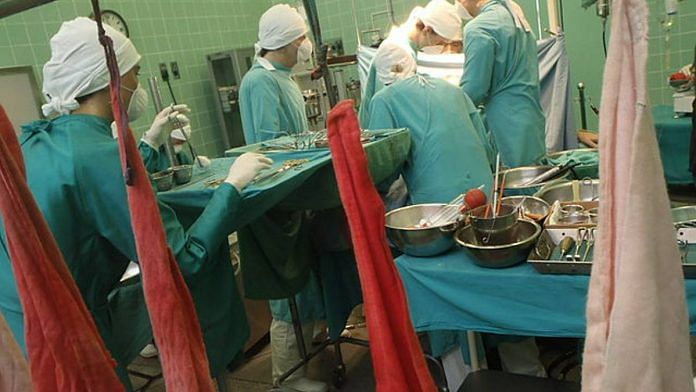New Delhi: The Centre has written to the state governments to closely monitor organ transplants involving foreign nationals in response to complaints about a surge in the number of foreigners benefitting from organ transplants in the country.
In a letter to the states earlier this month, the director general of health services (DGHS) under the Union health and family welfare ministry said appropriate authority in states should investigate transplants in cases where beneficiaries are foreign nationals — even when there is no complaint of violation of the Transplantation of Human Organs and Tissues Act (THOTA), 1994, and its rules.
ThePrint has a copy of the letter dated 10 April, 2024.
The letter added that states should ensure a unique NOTTO (National Organ and Tissue Transplant Organisation) ID for the donor and the recipient, generated in the hospital undertaking the procedure from the authority’s website in all cases of organ transplant, whether from a living or deceased donor.
The Centre has also asked the states to devise a system of regular inspection of the registered transplant or the organ retrieval by hospitals, so as to maintain onsite monitoring of their activities, the quality of transplantation, the post-operative follow-up of donor and recipient, and the outcomes of transplantation.
In cases of THOTA violation, the DGHS has directed the states to initiate action against defaulting hospitals by suspending licenses.
It also said the states have not been sharing data related to organ transplants despite repeated reminders by the Centre.
“Time and again, letters have been written to states for sharing of data related to organ donation and transplantation with NOTTO. However, complete data is still not being received,” said the DGHS.
Asking states to ensure regular collection of the data, the Centre has said that such data, including the involvement of foreign nationals in organ transplants, should be shared with NOTTO every month.
Also read: 70% of 36 popular protein supplements sold in India mislabeled, 14% contain toxins, says new study
Rising graph of organ transplants
According to data shared by the Union health ministry last year, the number of total organ transplants in the country has substantially increased from fewer than 5,000 in 2013 to more than 15,000 in 2022.
Now, more organs from deceased donors are used due to better coordination through a network of organ and tissue transplant organisations at the national, regional, and state levels, the government said at the time.
For instance, in 2016, 2,265 organs were used from 930 deceased donors while, in 2022, 2,765 were used from 904 deceased donors.
But a senior NOTTO official told ThePrint that there had been an increasing number of complaints that most beneficiaries are foreign nationals with higher paying capacities, while Indian patients are left waiting.
The THOTA Act, which allows both deceased and living donors to donate their organs and tissues, also made the commercialisation of organs a punishable offense, legalised the concept of brain death in India, and paved the way for the establishment of regulatory bodies to supervise the transplantation process.
“Despite these stringent regulations, occasional incidents of shady operations discourage donations, particularly from deceased donors,” noted a paper published in The Lancet in February this year.
India sees 17,000–18,000 solid organ transplants performed every year — the most in the world after the US and China — but remains behind several high-income countries in transplantation rates per million population, according to the paper.
The paper also pointed out progress, such as an improvement in the harvesting of organs from deceased donors, with the average number of organ transplants per donor increasing from 2.43 in 2016 to 3.05 in 2022.
“However, the majority of these surgeries are done by the country’s private health sector, which makes them unaffordable to most patients. Despite the progress in organ transplantation in India, particularly in nephrology, over the past five to six decades, inclusivity and equity for many patients is a big concern,” the paper also said.
(Edited by Madhurita Goswami)



